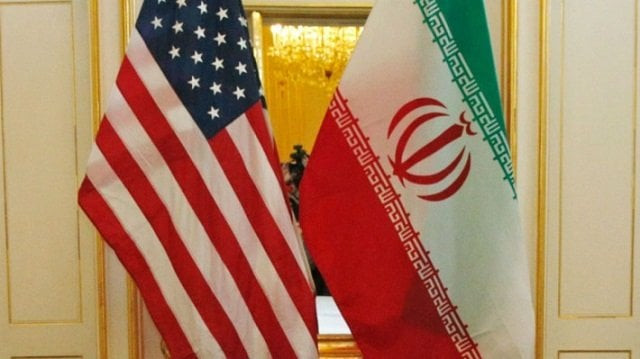US-Iran rift and implications for Pakistan
Peace and restraint has to be worked out with a consensus among the global and regional players

PHOTO: AFP
The tussle between Iran and the US is somewhat a rift between two groups of hardliners in two world capitals — Tehran and Washington. Both groups hold that their respective states have the right to expand their circle of influence in their own respective regions as well as beyond.
Iranian strategy is subtle, effective and at times deceptive. This strategy has worked for successive Iranian governments in carrying out their agenda successfully at home and abroad.
Iran’s larger role in the region with its proxies and its influence in the Middle East has alarmed its rivals. Iran’s General Qasim Sulemani, icon of Iranian military domination, has been named as one of the most influential people in the Middle East who is seen fighting on the war fronts in Syria and Iraq, effectively managing the Iranian proxies. This ambition and tactics to keep the enemy busy in other places before it knocks on the doors has given Iran an edge over its rivals in the Middle East.
Iran’s strategic maneuvers are not new to the international observers. Iran was given concession under Obama administration and in return was expected to limit the uranium enrichment. Obama’s nuclear deal with Iran gave Tehran the opportunity to stretch its muscle strategically and economically in the region. As a result, Iran now has influence from Yemen to Iraq and from Syria to Lebanon.
So what does the US wants from Iran now? Once again the White House administration has changed its policy on Iran. The US wants to push back Iran on the gains it made in recent years, especially during the second term of president Obama. In simple words, the Republicans want to undo what democrats did. The US has realised the gains that Iran has made at the cost of the interests of the US and its allies in the Middle East.
Nuclear deal with Iran was the single most important thing that strained the relations between Washington and Riyadh. Historically, the US looked after the Saudi interests and Saudis reciprocated it. That understanding relatively changed and almost came to halt under Obama’s presidency. This made Iran confidently peruse its strategic goals with economic ease.
The confusion on the part of the US is evident. They want to undo what US did under Obama but it’s tough to convince the European allies of the US. The statements from White House, President Trump himself and the US officials are mostly contradictory. The impression its gives is that the Trump Administration has taken a bigger bite than it can chew. It also lacks a clear policy on how to go about dealing with Iran.
Iran, however, is not without friends. Russia and China are Tehran’s strategic allies. That was witnessed in Syria where Iran and Russia’s joint efforts ensured the continuity of President Bashar al Assad’s regime.
This Russia-Iran collaboration is going to manifest itself in stronger ways when Iran and Russia are going to do joint military exercises in the Persian Gulf this year. This gives a very clear message around the globe on the Russia-Iran nexus. Russian Foreign Minister Lavrov has been vocal in criticising the ‘unacceptable situation’ created by the ‘irresponsible behaviour of the United States’.
While the war clouds are looming over the region, the implications can be dangerous for countries in the Middle East as well as in Asia.
Pakistan, a key player in the region, has been the victim of the ongoing war in Afghanistan. Pakistan is the only country perhaps that has been the direct victim of the war in Afghanistan. Any escalation from this point on between Iran and the US can be fatal for the regional peace and security, especially for Pakistan. It can put the ambitions of Pakistan and China on a standstill.
Pakistan has been actively pursuing its strategic options and goals in the region. In recent times, Islamabad has been working out for strategic support from within the region. Iran has been vital in this case. As the Afghan conundrum takes another turn, Pakistan and Iran collaborate to work for common regional threats and challenges to peace and stability. The visit of Prime Minister Imran Khan and senior Pakistani officials to Tehran was the continuity of Islamabad’s regional security approach.
There are several challenges that are common to both Pakistan and Iran. The IS threat from the Afghan soil is on the top of the list. While the Taliban and the US talk about settlement, it is vital for Pakistan and the regional countries to chalk out a mechanism which can ensure security of Pakistan and other countries in the region.
The ongoing war in Afghanistan has adversely affected the trade potential and connectivity between Central Asia and South Asia. The war in Afghanistan has already cost trillions of dollars to the US and billions to the regional economy. Another war can be a serious blow to Asian and Middle Eastern economies. Peace and restraint has to be worked out with a consensus among the global and regional players.
Published in The Express Tribune, June 25th, 2019.
Like Opinion & Editorial on Facebook, follow @ETOpEd on Twitter to receive all updates on all our daily pieces.















COMMENTS
Comments are moderated and generally will be posted if they are on-topic and not abusive.
For more information, please see our Comments FAQ